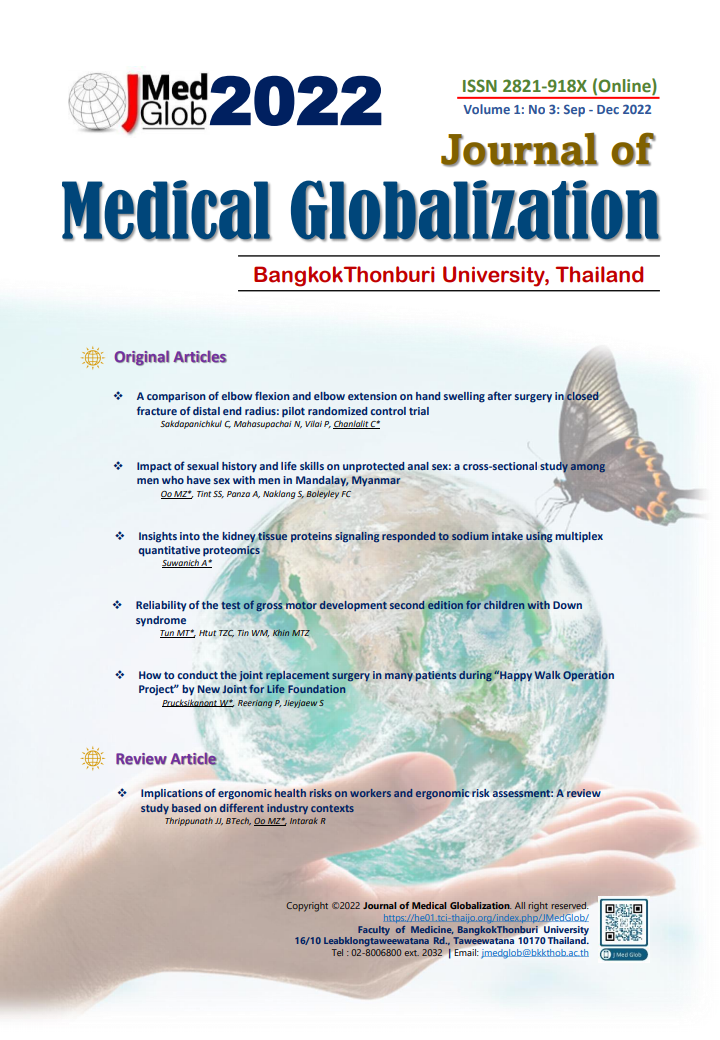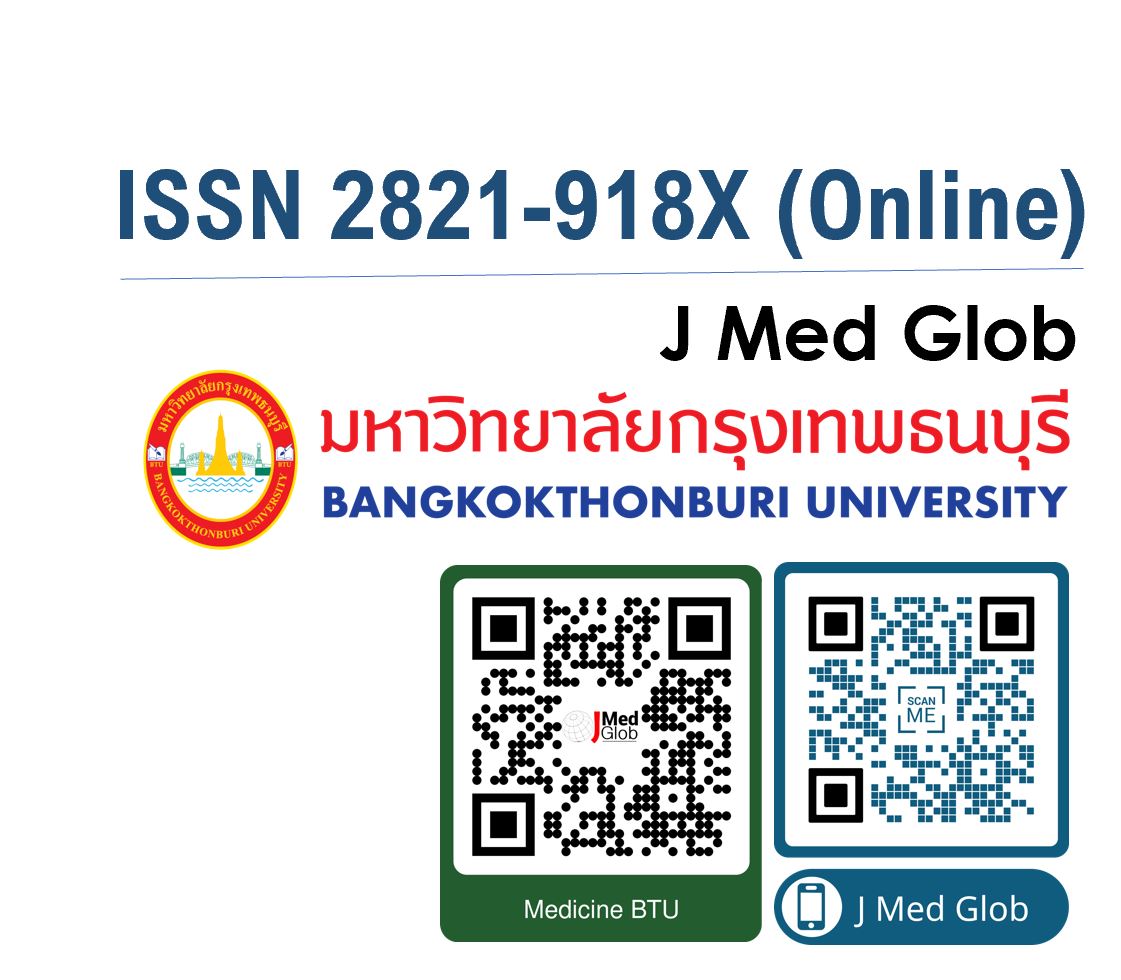Reliability of the test of gross motor development second edition for children with Down syndrome
คำสำคัญ:
Children with Down syndrome, Reliability, TGMD-2บทคัดย่อ
Objective: To investigate the test of gross motor development second edition (TGMD-2) test-retest, inter-rater, and intra-rater reliability for children with Down syndrome (DS).
Materials and Methods: The School for Disabled Children in Yangon provided 50 volunteers with DS for this reliability research. Before the assessment, all participants received an explanation of the TGMD-2 and saw all the skills in action. Each FMS had to be used twice for actual scoring, and each participant received one practice trial. The principal researcher videotaped and documented each participant's performance. The three raters watched and independently rated the recorded videos to assess inter-rater reliability. Test-retest reliability was assessed a second time two weeks later. For intra-rater reliability, the principal researcher reevaluated the identical video recordings from the initial evaluation four weeks later. Reliability was assessed using intraclass correlation coefficients (ICC) and Cronbach's alpha.
Results: The gross motor quotient, object control raw scores, and locomotor raw scores showed strong reliability coefficients.
Conclusion: Therefore, the TGMD-2 is an appropriate and highly reliable method to measure the FMS of children with DS, it can be inferred from the current findings.
เอกสารอ้างอิง
Ulrich DA. Test of Gross Motor Development: Examiner’s Manual. 2nd ed. Austin, TX: Pro-Ed; 2000.
Gallahue DL, Ozmun JC, Goodway JD. Understanding Motor Development: Infants, Children, Adolescents, Adults. 7th ed. Boston, MA: McGraw-Hill; 2012.
Haywood KM, Getchell N. Lifespan Motor Development. 6th ed. Champaign, IL: Human Kinetics; 2014.
Logan SW, Ross SM, Chee K, Stodden DF, Robinson LE. Fundamental motor skills: A systematic review of terminology. J Sports Sci. 2018;36(7):781-796.
Payne VG, Isaacs LD. Human Motor Development: A Lifespan Approach. 9th ed. New York: McGraw-Hill; 2016.
Pang AW, Fong DT. Fundamental motor skill proficiency of Hong Kong children aged 6-9 years. Res Sports Med. 2009;17(3):125-44.
Lubans DR, Morgan PJ, Cliff DP, Barnett LM, Okely AD. Fundamental movement skills in children and adolescents: review of associated health benefits. Sports Med. 2010;40(12):1019-35.
Hardy LL, Reinten-Reynolds T, Espinel P, Zask A, Okely AD. Prevalence and correlates of low fundamental movement skill competency in children. Pediatrics. 2012;130(2):e390-8.
Cohen KE, Morgan PJ, Plotnikoff RC, Callister R, Lubans DR. Fundamental movement skills and physical activity among children living in low-income communities: a cross-sectional study. Int J Behav Nutr Phys Act. 2014;11(1):49.
Barnett LM, Telford RM, Strugnell C, Rudd J, Olive LS, Telford RD. Impact of cultural background on fundamental movement skill and its correlates. J Sports Sci. 2019;37(5):492-499.
Bardid F, Rudd JR, Lenoir M, Polman R, Barnett LM. Cross-cultural comparison of motor competence in children from Australia and Belgium. Front Psychol. 2015;6:964.
Walker SP, Wachs TD, Gardner JM, Lozoff B, Wasserman GA, Pollitt E, Carter JA; International child development steering group. Child development: risk factors for adverse outcomes in developing countries. Lancet. 2007;369(9556):145-57.
Griffiths A, Toovey R, Morgan PE, Spittle AJ. Psychometric properties of gross motor assessment tools for children: a systematic review. BMJ Open. 2018;8(10):e021734.
Rey E, Carballo-Fazanes A, Varela-Casal C, Abelairas-Gómez C; ALFA-MOV Project collaborators. Reliability of the test of gross motor development: A systematic review. PLoS One. 2020;15(7):e0236070.
Barnett LM, Minto C, Lander N, Hardy LL. Interrater reliability assessment using the Test of Gross Motor Development-2. J Sci Med Sport. 2014;17(6):667-70.
Simons J, Daly D, Theodorou F, Caron C, Simons J, Andoniadou E. Validity and reliability of the TGMD-2 in 7-10-year-old Flemish children with intellectual disability. Adapt Phys Activ Q. 2008;25(1):71-82.
Valentini NC. Validity and reliability of the TGMD-2 for Brazilian children. J Mot Behav. 2012;44(4):275-80.
Houwen S, Hartman E, Jonker L, Visscher C. Reliability and validity of the TGMD-2 in primary-school-age children with visual impairments. Adapt Phys Activ Q. 2010;27(2):143-59.
Aye T, Oo KS, Khin MT, Kuramoto-Ahuja T, Maruyama H. Reliability of the test of gross motor development second edition (TGMD-2) for Kindergarten children in Myanmar. J Phys Ther Sci. 2017;29(10):1726-1731.
Lopes VP, Saravia L, Rodrigues LP. Reliability and construct validity of the test of gross motor development-2 in Portuguese children. Int J Sport Exerc Psychol. 2018; 16(3), 250-60.
Capio CM, Eguia KF, Simons J. Test of gross motor development-2 for Filipino children with intellectual disability: validity and reliability. J Sports Sci. 2016;34(1):10-7.
Kim S, Kim MJ, Valentini NC, Clark JE. Validity and reliability of the TGMD-2 for South Korean children. J Mot Behav. 2014;46(5):351-6.
Asim A, Kumar A, Muthuswamy S, Jain S, Agarwal S. Down syndrome: an insight of the disease. J Biomed Sci. 2015; 22(1):41.
Bertoti DB, Schreiner MB. Intellectual Disabilities: Focus on Down syndrome. In: Tecklin JS, eds. Pediatric Physical Therapy. 5th ed. Lippincott Williams & Wilkins a Wolters Kluwer business; 2015: 379-402.
Roizen NJ, Patterson D. Down's syndrome. Lancet. 2003; 361(9365):1281-9.
Spanò M, Mercuri E, Randò T, Pantò T, Gagliano A, Henderson S, Guzzetta F. Motor and perceptual-motor competence in children with Down syndrome: variation in performance with age. Eur J Paediatr Neurol. 1999;3(1):7-13.
Winders P, Wolter-Warmerdam K, Hickey F. A schedule of gross motor development for children with Down syndrome. J Intellect Disabil Res. 2019;63(4):346-356.
Meiser M, Maule M, McEwen I, Jones M, Sylvester L. (2017). Children with Motor and Intellectual Disabilities. In: Palisano RJ, Orlin MN, Schreiber J, eds. Campbell’s Physical Therapy for Children. 5th ed. Elsevier Inc.; 2017: 423-436.
Block ME. Motor development in children with Down syndrome: A review of the literature. Adapt Phys Activ Q. 1991; 8 (3), 179-209.
Malak R, Kostiukow A, Krawczyk-Wasielewska A, Mojs E, Samborski W. Delays in motor development in children with Down syndrome. Med Sci Monit. 2015;21:1904-10.
Tun MT, Aye T, Khin MT. Inter-rater reliability of the Test of Gross Motor Development Second Edition (TGMD-2) for Children with Down Syndrome: A Pilot study. J Asi Reha Sci. 2021; 4 (3), 39-46.
Portney LG, Watkin MP. Foundation of Clinical Research: Application to Practice. 3rd ed. Philadelphia: USA, F. A. Davis Company; 2015.
George D, Mallery P. SPSS for Windows step by step: A Simple Guide and Reference. 4th ed. Boston: Allyn & Bacon; 2003.
Gajewski BJ, Hróbjartsson A, Roberts C, Shoukri M, Streiner DL. Guidelines for Reporting Reliability and Agreement Studies (GRRAS) were proposed. J Clin Epidemiol. 2011;64(1):96-106.
Bolger LE, Bolger LA, O'Neill C, Coughlan E, O'Brien W, Lacey S, Burns C, Bardid F. Global levels of fundamental motor skills in children: A systematic review. J Sports Sci. 2021;39(7):717-753.
Robertson S, Kremer P, Aisbett B, Tran J, Cerin E. Consensus on measurement properties and feasibility of performance tests for the exercise and sport sciences: a Delphi study. Sports Med Open. 2017;3(1):2.
Palmer KK, Brian A. Test of Gross Motor Development-2 Scores Differ Between Expert and Novice Coders. J Mot Learn Dev. 2016; 4 (2), 142-151.
Koo TK, Li MY. A Guideline of Selecting and Reporting Intraclass Correlation Coefficients for Reliability Research. J Chiropr Med. 2016;15(2):155-63.
Currell K, Jeukendrup AE. Validity, reliability and sensitivity of measures of sporting performance. Sports Med. 2008;38(4):297-316.
เผยแพร่แล้ว
รูปแบบการอ้างอิง
ฉบับ
ประเภทบทความ
สัญญาอนุญาต
ลิขสิทธิ์ (c) 2023 วารสารการแพทย์โลกาภิวัฒน์

อนุญาตภายใต้เงื่อนไข Creative Commons Attribution-NonCommercial 4.0 International License.








